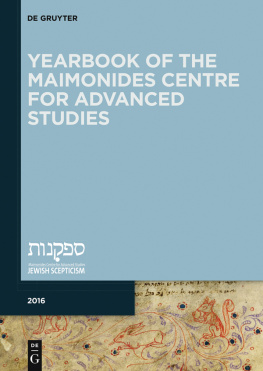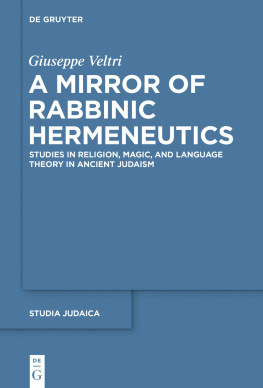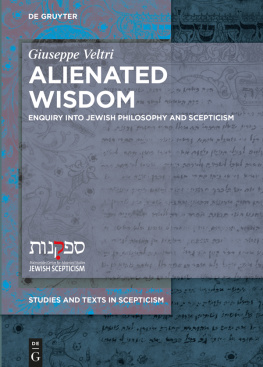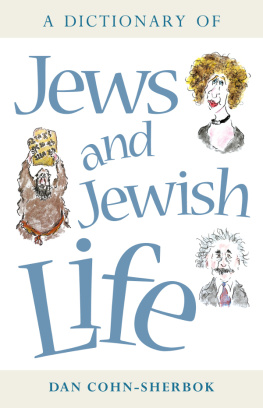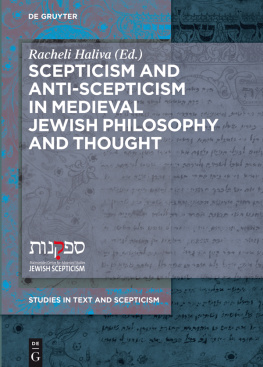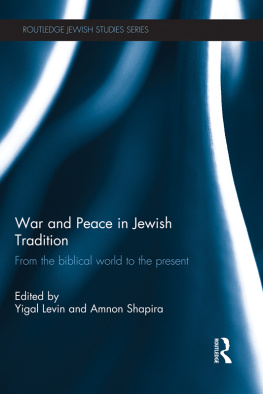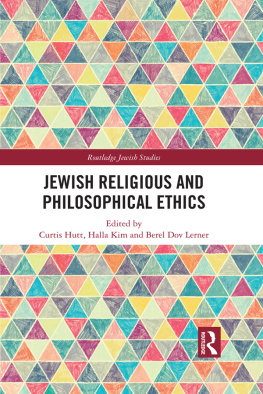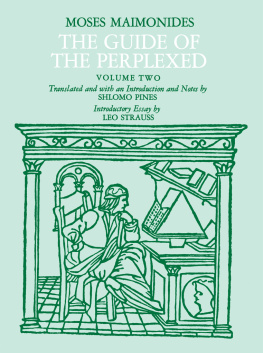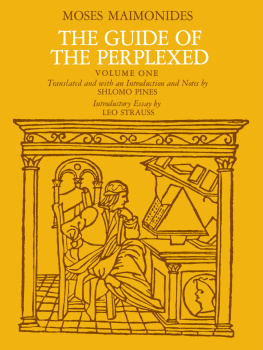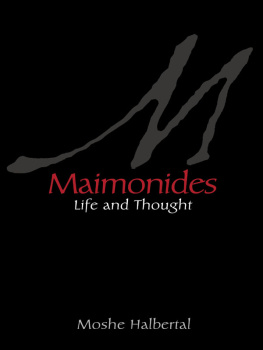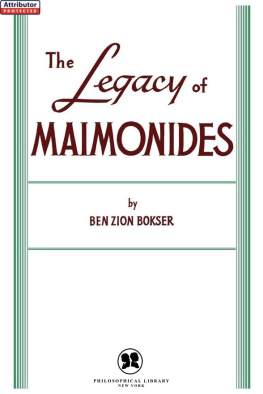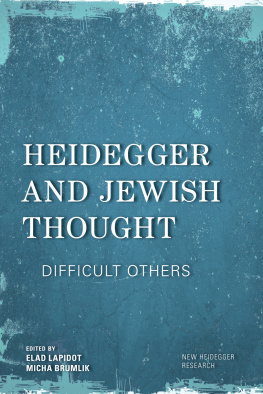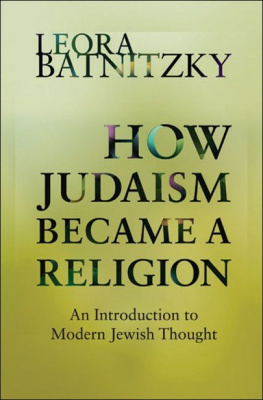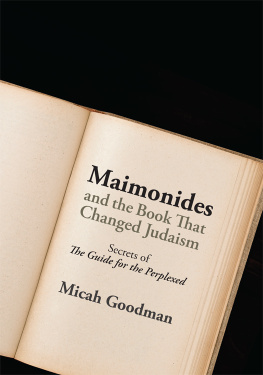Yearbook of the Maimonides Centre for Advanced Studies 2016
Guide

Yearbook of the Maimonides Centre for Advanced Studies 2016
Jewish Thought, Philosophy, and Religion
Edited by
Giuseppe Veltri
Editorial Board
Talya Fishman, Racheli Haliva, Henrik Lagerlund, Reimund Leicht,
Stephan Schmid, Carsten Wilke, Irene Zwiep
Volume 1

Yearbook of the Maimonides Centre for Advanced Studies
Edited by
Giuseppe Veltri

The series Jewish Thought, Philosophy and Religion is published on behalf of the Maimonides Centre for Advanced Studies

ISBN 978-3-11-048732-9
e-ISBN (PDF) 978-3-11-050172-8
e-ISBN (EPUB) 978-3-11-049890-5
ISSN 2509-7423

This work is licensed under the Creative Commons Attribution-NonCommercial-NoDerivs 3.0 License. For details go to http://creativecommons.org/licenses/by-nc-nd/3.0/.
Library of Congress Cataloging-in-Publication Data
A CIP catalog record for this book has been applied for at the Library of Congress.
Bibliographic information published by the Deutsche Nationalbibliothek
The Deutsche Nationalbibliothek lists this publication in the Deutsche Nationalbibliografie; detailed
bibliographic data are available in the Internet at http://dnb.dnb.de.
2016 Walter de Gruyter GmbH, Berlin/Boston
www.degruyter.com
Giuseppe Veltri
Editorial
We are pleased to present the first Yearbook of the Maimonides Centre for Advanced Studies, which documents the activities of 201516, our first academic year.
The central aim of the Maimonides Centre, which was founded at the University of Hamburg in October 2015, is the exploration of and research into scepticism, first and foremost in Judaism, in its dual manifestation: firstly as a purely philosophical tradition and secondly as a more general expression of sceptical strategies, concepts, and cultural attitudes.
Scepticism is understood by us as an enquiry by the perpetual student who harbours doubts about different dimensions and systems of secular or revealed knowledge, thereby calling authority into question. Scepticism does not represent an intellectual or theoretical worldview, but rather an attitude that provides a basis for numerous and diverse phenomena. It addresses fundamental processes and categorisations in Jewish philosophy, religion, literature, and society. More specifically, the term scepticism is applied to expressions of social deviance from, and conformity with, political structures. It is also applied to systems of governance, in response to and in exchange with adjacent cultures.
Research into Jewish philosophical scepticism is still in its very beginning. This also holds true for research into cultural expressions of scepticism, i.e. modes of sceptical strategies present in Jewish literature, cultural practices, history, organisation of social groups, and especially education. The apparent lack of interest in the intricacies of Jewish scepticism in the field of Jewish Studies may be rooted in the modality of Jewish philosophy. This field notoriously finds itself between the disciplines, and this subsumes and affects traditional wisdom, philosophy, theology, and both Jewish and general Weltanschauung , as well as cultural history, representing a hazardous bridge between orthopraxy and orthodoxy. The invisibility of the particular (i.e. Judaism) due to its immersion into general philosophy could be one reason for the lack of interest.
Here, the need for an imaginative grammar, corresponding to the demands of a language of scepticism in the history of Jewish philosophy and cultural history as well as in that of adjacent cultures, becomes apparent. This issue can be addressed by researchers at the Centre, who aim to benefit from comparative perspectives, thus gaining new insights into Western philosophy and culture and their inherent connections to texts and manifestations of Eastern cultures and thought. We believe this approach to be essential for mapping the transcultural dimensions of this barely explored field of research.
At the Centre we aim to offer outstanding conditions for research and for a fertile exchange of ideas. The successful creation of an inspiring atmosphere, favouring original research based on continuous dialogue, depends on the establishment of an interconnected academic community of scholars. Experts from many different fields gather in Hamburg in order to develop innovative approaches and methods.
Our fellowship programme gives internationally established scholars and aspiring junior researchers the opportunity to spend time in Hamburg, for both shorter and for more extended visits. Both fellowship programmes have been designed with the aim of creating a school of learning, a place where senior and junior scholars can closely collaborate, similar to the ancient academies.
We trust that the content of this volume adequately conveys the activities of our first year, our discussions, debates, and exchanges of ideas, which took place in a variety of formats: regular Dialectical and Reading Evenings, Workshops and Lectures. A Dialectical Evening consists of a debate between two or more opponents, in order to learn and practice sceptical strategies of discourse on truth, (un)certainty, and philosophical or cultural dogmas and questions. A Reading Evening , where texts in different languages and from different intellectual traditions are read together, poses a different challenge altogether. Each participant translates not only texts, but also ideas, concepts, and systems of thought from his or her own project for the benefit of the other participants, in order to prepare for the communal reading and discussion of a primary text relevant to their project. The Workshop , in the format of day-long mini-conference, thematises topics and areas of common interest. This year, workshops were dedicated to subjects such as sceptical controversies, dogma and doubt, conversion, sceptical topoi in ancient Judaism, and polemics in the Middle Ages. Within the framework of the series of the Maimonides Lectures on Scepticism, which take place three or four times a year, eminent scholars focusing on various aspects of scepticism are invited to present and discuss their research topics in an evening lecture. The Annual Lecture, which is delivered by an internationally acclaimed expert in his or her field, is the solemn inauguration of every new academic year at the Centre. On the following pages, you will find a timeline and full description of our activities.
Publishing a yearbook serves a number of purposes: it showcases articles written by Fellows and Research Associates of the Centre, records the activities of its temporary and permanent members, and documents the development of the Centres library and database resources. By producing a yearbook, we wish to encourage the Centres Fellows and Research Associates to publish not only comprehensive articles providing the academic community with the results of finished research projects, but also works-in-progress and first drafts. However, all articles are subject to a peer review process identical to that established for academic journals. The deadline for the submission of articles and reports was the end of June 2016. In order to present the activities up to the end of the academic year, the editors decided that Fellows whose period of stay at the Centre would begin after June would be included with an excerpt from their original research proposal rather than a report. Articles are presented in chronological order of topics, and reports in chronological order of periods of fellowship.

